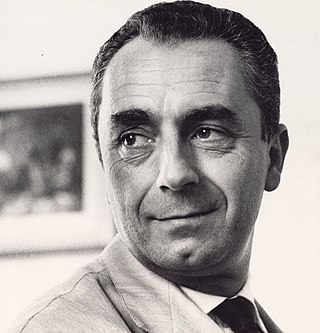
Hindi cinema, popularly known as Bollywood and formerly as Bombay cinema, refers to the film industry based in Mumbai, engaged in production of motion pictures in Hindi language. The popular term Bollywood, is a portmanteau of "Bombay" and "Hollywood". The industry is a part of the larger Indian cinema, which also includes South Cinema and other smaller film industries.

The cinema of China is one of three distinct historical threads of Chinese-language cinema together with the cinema of Hong Kong and the cinema of Taiwan.

Michelangelo Antonioni was an Italian director and filmmaker. He is best known for his "trilogy on modernity and its discontents"—L'Avventura (1960), La Notte (1961), and L'Eclisse (1962)—as well as the English-language film Blow-up (1966), all considered masterpieces of world cinema.

In the Mood for Love is a 2000 romantic drama film written, produced and directed by Wong Kar-wai. A co-production between Hong Kong and France, it portrays a man and a woman whose spouses have an affair together and who slowly develop feelings for each other. It forms the second part of an informal trilogy, alongside Days of Being Wild and 2046.

The Melbourne International Film Festival (MIFF) is an annual film festival held over three weeks in Melbourne, Australia. It was founded in 1952 and is one of the oldest film festivals in the world following the founding of the Venice Film Festival in 1932, Cannes Film Festival in 1939 and Berlin Film Festival in 1951. Originally launched at Olinda outside Melbourne in 1952 as the Olinda Film Festival, in 1953, the event was renamed the Melbourne Film Festival. It held this title over many decades before transforming in the Melbourne International Film Festival. MIFF is one of Melbourne's four major film festivals, in addition to the Melbourne International Animation Festival (MIAF), Melbourne Queer Film Festival (MQFF) and Melbourne Underground Film Festival (MUFF). Erwin Rado was the Melbourne Film Festival's iconic director appointed in 1956. The Australian Dictionary of Biography notes Mr Rado was the Festival's first paid director and also shaped its character with his 'uncompromising drive for excellence'. He served as MIFF Director until 1980, returning to stage the 1983 event. Other notable Directors include Tait Brady, Sandra Sdraulig, James Hewison, Artistic Director Michelle Carey and current AD, Al Cossar appointed 2018.

Hou Hsiao-hsien is a Mainland Chinese-born Taiwanese film director, screenwriter, producer and actor. He is a leading figure in world cinema and in Taiwan's New Wave cinema movement. He won the Golden Lion at the Venice Film Festival in 1989 for his film A City of Sadness (1989), and the Best Director award at the Cannes Film Festival in 2015 for The Assassin (2015). Other highly regarded works of his include The Puppetmaster (1993) and Flowers of Shanghai (1998).

The Busan International Film Festival, held annually in Haeundae-gu, Busan, South Korea, is one of the most significant film festivals in Asia. The first festival, held from 13 to 21 September 1996, was also the first international film festival in Korea. The main focus of the BIFF is to introduce new films and first-time directors, especially those from Asian countries. Another notable feature is the appeal of the festival to young people, both in terms of the large youthful audience it attracts and through its efforts to develop and promote young talent. In 1999, the Pusan Promotion Plan was established to connect new directors to funding sources. The 16th BIFF in 2011 saw the festival move to a new permanent home, the Busan Cinema Center in Centum City.

Chemmeen is a 1965 Indian Malayalam-language romance film, based on the novel of the same name by Thakazhi Sivasankara Pillai. It was adapted into a screenplay by S. L. Puram Sadanandan, directed by Ramu Kariat, and produced by Babu Ismail Sait under the banner Kanmani Films. The film stars Sheela as Karuthamma, Madhu as Pareekutty, Kottarakkara Sreedharan Nair as Chembankunju, and Sathyan as Palani. The film tells the story of a pre-marital and later extra-marital relationship between Karuthamma, the daughter of an ambitious fisherman, and Pareekutty, the son of an affluent trader.

Cai Chusheng was a Chinese film director of the pre-Communist era, and was the first Chinese director to win an international film award at the Moscow International Film Festival. Best known for his progressive output in the 1930s, Cai Chusheng was later severely persecuted and died during the Cultural Revolution. His ashes are kept at the Babaoshan Revolutionary Cemetery in Beijing.

The United Photoplay Service Company was one of the three dominant production companies based in Shanghai, China during the 1930s, the other two being the Mingxing Film Company and the Tianyi Film Company, the forerunner of the Hong Kong-based Shaw Brothers Studio.
The Network for the Promotion of Asian Cinema (NETPAC) is a worldwide organization of 29 member countries. It was created as the result of a conference on Asian cinema organized by Cinemaya, the Asian Film Quarterly, in New Delhi in 1990 at the instance and with the support of UNESCO, Paris.
Cinema of the United Arab Emirates began with a number of feature films that were broadcast on national television since the late 1980s.

The Great Road, also known as The Big Road and The Highway, is a 1934 Chinese silent film directed by Sun Yu, produced in 1934 and released on January 1, 1935. The film stars Jin Yan and Li Lili, and was produced by Sun Yu specifically for Li Lili to capitalize on her image and rising popularity. The Great Road is a silent film that was designed with a soundtrack, with music and sound effects added post-production. This film is another masterpiece written by Sun Yu after Wild Rose (1931) and Little Toys (1933) as part of the National Defense Cinema with anti-Japanese elements. While it was critically dubbed as a "hard film", Sun Yu made no explicit references that “the enemy nation” in the film was Japan, and the film contained no direct confrontation with “the enemy” on a battlefield, under the Kuomintang government's censorship policy designed to prevent provoking the Japanese. Instead, he used the building of a road to defeat "the enemy" invaders to express the spirit of the Anti-Japanese War in an "elegant and romantic" way. Sun Yu called The Great Road his "representative work".

Xiaolu Guo FRSL is a Chinese-born British novelist, memoirist and film-maker, who explores migration, alienation, memory, personal journeys, feminism, translation and transnational identities.
Plunder of Peach and Plum is an early Chinese sound film from 1934. Produced by the left-leaning Shanghai-based Diantong Film Company, Plunder was directed by Ying Yunwei and starred popular actor Yuan Muzhi. It is alternatively known as The Fate of Graduates.

The Asian Film Awards are presented annually by the Asian Film Awards Academy to recognise the excellence of the film professionals in the film industries of Asian cinema.
Diantong Film Company was a short-lived but important film studio and production company during the 1930s in Shanghai, China. Though it produced only four films during its existence between 1934-1935, all four films became important examples of the left-leaning Chinese cinema of the 1930s. Of all the film studios of the period, Diantong had the closest connection to the Chinese Communist Party.

Mondo Cane is a 1962 Italian mondo documentary film and directed by the trio of Gualtiero Jacopetti, Paolo Cavara, and Franco E. Prosperi, with narration by Stefano Sibaldi. The film consists of a series of travelogue scenes that provide glimpses into cultural practices around the world with the intention to shock or surprise Western film audiences. These scenes are presented with little continuity, as they are intended as a kaleidoscopic display of shocking content rather than presenting a structured argument. Despite its claims of genuine documentation, certain scenes are either staged or creatively manipulated to enhance this effect.

Wang Renmei was a famous Chinese actress and singer nicknamed the "Wildcat of Shanghai". She was mainly active during the 1930s, and her most notable film was the 1934 Song of the Fishermen directed by Cai Chusheng, which was the first Chinese film to win an international prize. In 2005, she was chosen as one of the 100 best actors of the 100 years of Chinese cinema.

Chloé Zhao, is a Chinese-born filmmaker. She is known primarily for her work on independent films.















